(完整)初三英语中考专题复习:时态和语态
中考英语时态与语态精讲
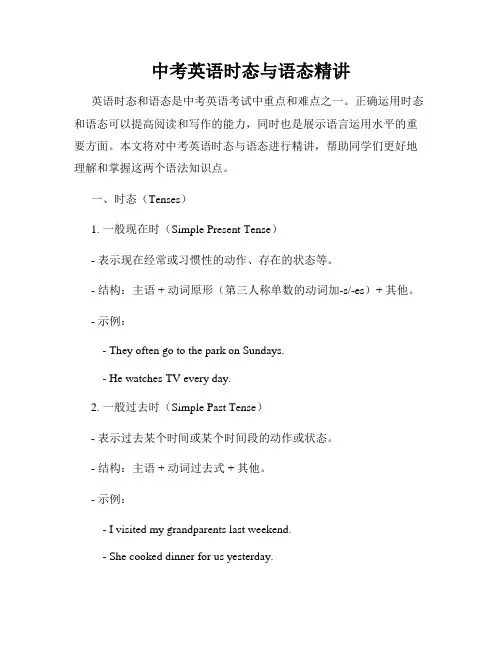
中考英语时态与语态精讲英语时态和语态是中考英语考试中重点和难点之一。
正确运用时态和语态可以提高阅读和写作的能力,同时也是展示语言运用水平的重要方面。
本文将对中考英语时态与语态进行精讲,帮助同学们更好地理解和掌握这两个语法知识点。
一、时态(Tenses)1. 一般现在时(Simple Present Tense)- 表示现在经常或习惯性的动作、存在的状态等。
- 结构:主语 + 动词原形(第三人称单数的动词加-s/-es)+ 其他。
- 示例:- They often go to the park on Sundays.- He watches TV every day.2. 一般过去时(Simple Past Tense)- 表示过去某个时间或某个时间段的动作或状态。
- 结构:主语 + 动词过去式 + 其他。
- 示例:- I visited my grandparents last weekend.- She cooked dinner for us yesterday.3. 一般将来时(Simple Future Tense)- 表示将来某个时间或某个时间段的动作或状态。
- 结构:主语 + will + 动词原形 + 其他。
- 示例:- We will have a party next week.- He will call you later.4. 现在进行时(Present Continuous Tense)- 表示现在正在进行的动作。
- 结构:主语 + am/is/are + 动词-ing + 其他。
- 示例:- They are playing basketball in the park right now. - She is reading a book at the moment.5. 过去进行时(Past Continuous Tense)- 表示过去某个时间或某个时间段正在进行的动作。
中考重点时态与语态的运用
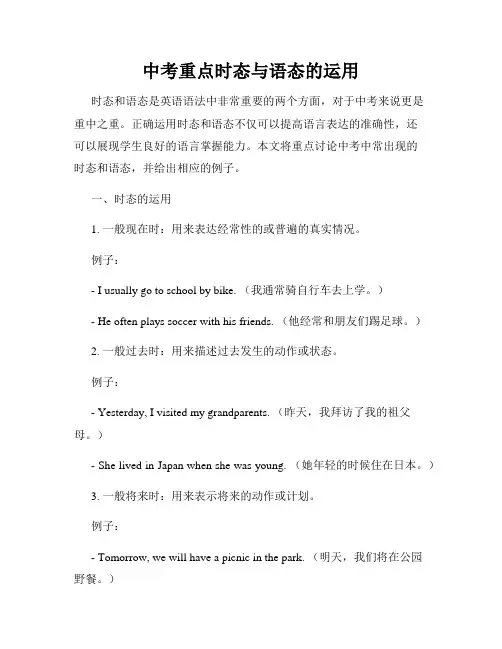
中考重点时态与语态的运用时态和语态是英语语法中非常重要的两个方面,对于中考来说更是重中之重。
正确运用时态和语态不仅可以提高语言表达的准确性,还可以展现学生良好的语言掌握能力。
本文将重点讨论中考中常出现的时态和语态,并给出相应的例子。
一、时态的运用1. 一般现在时:用来表达经常性的或普遍的真实情况。
例子:- I usually go to school by bike. (我通常骑自行车去上学。
)- He often plays soccer with his friends. (他经常和朋友们踢足球。
)2. 一般过去时:用来描述过去发生的动作或状态。
例子:- Yesterday, I visited my grandparents. (昨天,我拜访了我的祖父母。
)- She lived in Japan when she was young. (她年轻的时候住在日本。
)3. 一般将来时:用来表示将来的动作或计划。
例子:- Tomorrow, we will have a picnic in the park. (明天,我们将在公园野餐。
)- I'm going to visit my friend next week. (我下周打算去拜访我的朋友。
)4. 现在进行时:用来表示现在正在进行的动作。
例子:- She is studying in the library now. (她现在正在图书馆学习。
)- They are playing basketball in the gym. (他们在体育馆打篮球。
)5. 过去进行时:用来表示过去某个时间点正在进行的动作。
例子:- We were watching a movie at 8 o'clock last night. (昨晚8点我们正在看电影。
)- He was cooking dinner when I called him. (当我打电话给他时他正在做晚饭。
初三(九年级)英语语法大全
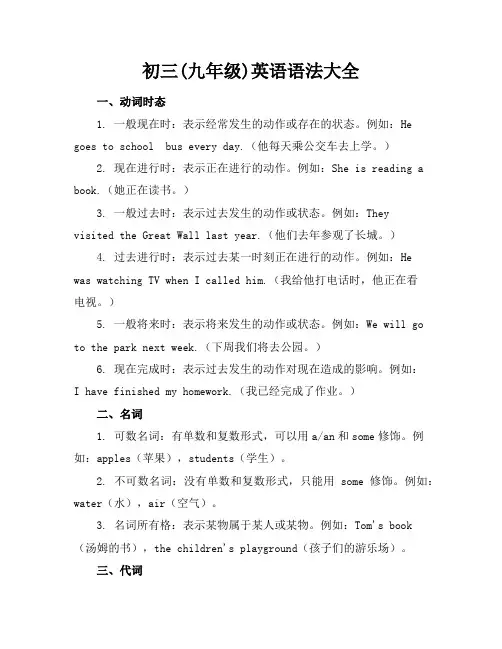
初三(九年级)英语语法大全一、动词时态1. 一般现在时:表示经常发生的动作或存在的状态。
例如:He goes to school bus every day.(他每天乘公交车去上学。
)2. 现在进行时:表示正在进行的动作。
例如:She is reading a book.(她正在读书。
)3. 一般过去时:表示过去发生的动作或状态。
例如:Theyvisited the Great Wall last year.(他们去年参观了长城。
)4. 过去进行时:表示过去某一时刻正在进行的动作。
例如:He was watching TV when I called him.(我给他打电话时,他正在看电视。
)5. 一般将来时:表示将来发生的动作或状态。
例如:We will go to the park next week.(下周我们将去公园。
)6. 现在完成时:表示过去发生的动作对现在造成的影响。
例如:I have finished my homework.(我已经完成了作业。
)二、名词1. 可数名词:有单数和复数形式,可以用a/an和some修饰。
例如:apples(苹果),students(学生)。
2. 不可数名词:没有单数和复数形式,只能用some修饰。
例如:water(水),air(空气)。
3. 名词所有格:表示某物属于某人或某物。
例如:Tom's book(汤姆的书),the children's playground(孩子们的游乐场)。
三、代词1. 人称代词:I(我),you(你/你们),he(他),she(她),it(它),we(我们),they(他们)。
2. 物主代词:my(我的),your(你的/你们的),his(他的),her(她的),its(它的),our(我们的),their(他们的)。
3. 指示代词:this(这个),that(那个),these(这些),those(那些)。
初三复习 时态和语态
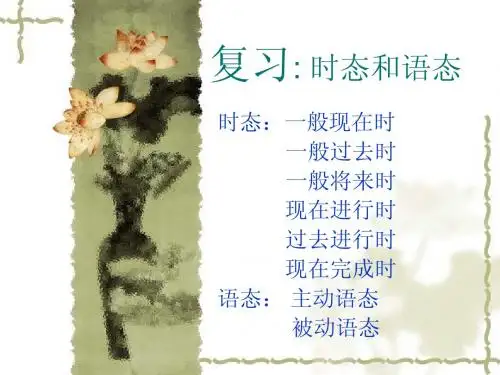
一般现在时的用法
经常性动作等。常与everyday, often, always, once a week, seldom, usually等连用。 She always goes to school by bus. 真理和事实。 Light travels faster than sound. 在由when, if, before, as soon as, unless等引导的时间状 语从句和条件状语从句中,用一般现在时代替一般将来时。 When I grow up, I will be a soldier.(主将从现) 表示主语的习惯特征,性格,能力等。 He studies very hard.
(2)一般过去时: Past Simple
概念: 结构:
表示过去发生的动作 did 标志语: yesterday、... ago、 in 1992、 last week/month…
一般过去时的用法
1.表示过去的某个时间发生的动作或存在的状态,常和明确的时间状语 连用。 (或有上下文语境暗示)
The moment she came in, she toldห้องสมุดไป่ตู้me what had happened to her. He bought a watch but lost it.
动词-ed形式的构成:
want 在动词后加-ed answer 以字母e 结尾的动 move 词,只+d die “ 辅音字母+y ” , carry 去y 改i, 再+ed cry stop 重读闭音节结尾 的,双写+ed plan
do cut say
标志语:Look! 、 Listen! 、now
现在进行时的概念
中考英语语法时态与语态知识点汇总
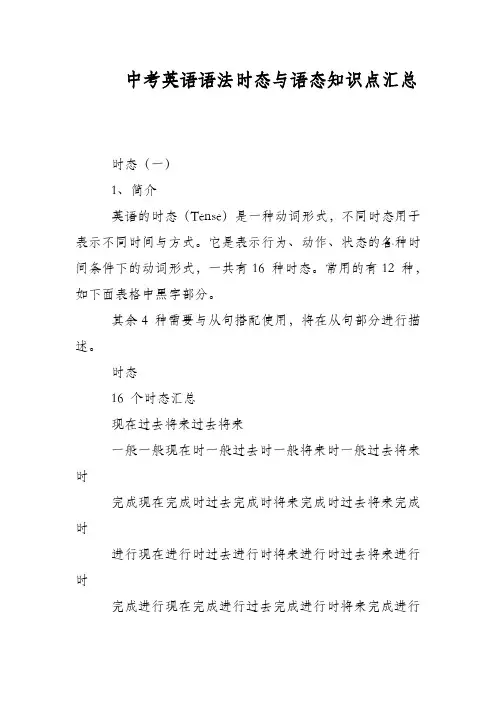
中考英语语法时态与语态知识点汇总时态(一)1、简介英语的时态(Tense)是一种动词形式,不同时态用于表示不同时间与方式。
它是表示行为、动作、状态的各种时间条件下的动词形式,一共有16 种时态。
常用的有12 种,如下面表格中黑字部分。
其余4 种需要与从句搭配使用,将在从句部分进行描述。
时态16 个时态汇总现在过去将来过去将来一般一般现在时一般过去时一般将来时一般过去将来时完成现在完成时过去完成时将来完成时过去将来完成时进行现在进行时过去进行时将来进行时过去将来进行时完成进行现在完成进行过去完成进行时将来完成进行过去将来完成进行时2、主要四种时态本章节先学习四种时态:•一般现在时:do /does,最近都会发生的相同的动作(表示常态平常,总是,老是这样)•一般过去式:did,动作在过去发生•一般将来时:be going to do,动作还未发生(有准备,打算的意味)。
•现在进行时:be doing,动作正在发生(正在进行的动作)3、句子的公式针对四种基本时态,句子的公式疑问词+ 时表词+ 主语+ 句剩+ 动词+ 其他【注】主语是动作的发起者,宾语是动作的承受者,句剩只有在一般将来时才用!【例句】1、你刚才去哪儿了?Where did you go?2、你平常都什么时候回来?When do you come back?3、你在吃什么?What are you eating?4、你怎么跟他说的?How did you tell him4、人称相关人称主格宾格形容词性物主代词名词性物主代词反身代词第一人称我I me my mine myself我们we us our ours ourselves第二人称你You you your yours yourself你们you you your yours yourselves 第三人称他he him his his himself她she her her hers herself句子的结构疑问词时表词主语句剩动词其他Who / Whom/ What/ Whose / Which /When / Where / Why/ How注:Who 和Whom算一个,后续章节将详细讲解疑问词一般现在时:do / does第一人称第二人称第三人称动作doing一般过去式:did一般将来时:be(am/is/are)going to现在进行时:be(am/is/are)它it it its its itself他们They them their theirs themselves【注】此表格格外重要,不要忽视!!!时态(二)1、简介•时态和句子结构清楚后,开始造句,按句子类型分为陈述句和疑问句。
中考英语时态与语态精讲
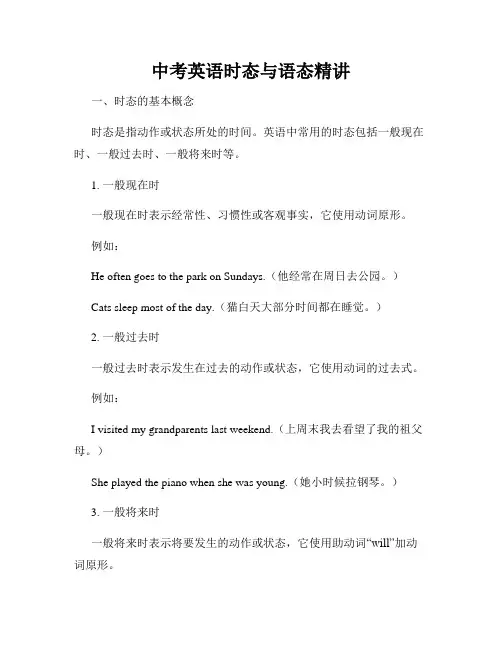
中考英语时态与语态精讲一、时态的基本概念时态是指动作或状态所处的时间。
英语中常用的时态包括一般现在时、一般过去时、一般将来时等。
1. 一般现在时一般现在时表示经常性、习惯性或客观事实,它使用动词原形。
例如:He often goes to the park on Sundays.(他经常在周日去公园。
)Cats sleep most of the day.(猫白天大部分时间都在睡觉。
)2. 一般过去时一般过去时表示发生在过去的动作或状态,它使用动词的过去式。
例如:I visited my grandparents last weekend.(上周末我去看望了我的祖父母。
)She played the piano when she was young.(她小时候拉钢琴。
)3. 一般将来时一般将来时表示将要发生的动作或状态,它使用助动词“will”加动词原形。
例如:I will go to the concert tomorrow.(明天我要去音乐会。
)They will finish their homework before dinner.(他们会在晚饭前完成作业。
)二、时态的变化规则时态的变化基本上是通过动词的变化来实现的。
1. 一般现在时的变化规则- 对于大多数动词,直接使用动词原形。
例如:I play football with my friends every Sunday.(我每个星期日都和朋友们踢足球。
)- 对于第三人称单数形式,加上“-s”或“-es”。
例如:She reads books every night.(她每晚都看书。
)- 对于以“-sh”、“-ch”、“-x”、“-o”结尾的动词,加上“-es”。
例如:He watches TV after dinner.(他晚饭后看电视。
)2. 一般过去时的变化规则- 对于大多数动词,加上“-ed”或者改变动词本身。
例如:They played basketball yesterday.(昨天他们打篮球。
中考重点时态与语态的正确运用
中考重点时态与语态的正确运用时态和语态是英语中非常重要的语法要点,也是中考中的重点内容。
正确地运用时态和语态能够帮助我们准确表达动作发生的时间以及对动作的描述。
一、时态的正确运用1. 一般现在时一般现在时表示经常性、习惯性或普遍真理的动作。
例如:- The sun rises in the east.(太阳从东方升起)- I often go to the park after school.(我放学后经常去公园)2. 现在进行时现在进行时表示现在正在进行或发生的动作。
例如:- He is playing basketball now.(他正在打篮球)- They are studying for the final exams.(他们正在备战期末考试)3. 一般过去时一般过去时表示在过去某个时间发生的动作。
例如:- She lived in Beijing when she was a child.(她小时候住在北京)- We visited the museum last week.(上周我们去参观了博物馆)4. 过去进行时过去进行时表示过去某个时间正在进行的动作。
例如:- This time last year, we were traveling in Japan.(去年的这个时候,我们在日本旅行)- I was studying when the phone rang.(电话响时,我正在学习)5. 将来时将来时表示将来某个时间将要发生的动作。
例如:- We will have a meeting tomorrow.(我们明天要开会)- She is going to visit her grandparents next weekend.(下周末她将去看望她的祖父母)二、语态的正确运用1. 主动语态主动语态表示主语是动作的执行者。
例如:- He wrote a novel.(他写了一本小说)- They are building a new house.(他们正在建设一座新房子)2. 被动语态被动语态表示主语是动作的接受者。
九年级英语总复习--动词的时态和语态
九年级总复习---动词考点二:动词的时态和语态(一)动词的时态1.一般现在时:(1)用法:表示现阶段经常性、习惯性或存在的状态、特征、客观真理等。
常用时间状语有often,usually,always,every day等。
(2)结构:主语+动词原形/动词散三单。
(3)在条件状语从句和时间状语从句中,用一般现在时表示将来。
2.一般过去时:(1)用法:表示过去某时间发生的事、存在的状态或过去反复发生的动作等。
常用的时间状语有yesterday,yesterday morning/ afternoon/ evening,last week month/ year,in 2000,two years ago等。
(2)结构:主语+动词过去式。
3.一般将来时:(1)用法:表示将来某个时间要发生的动作或存在的状态等,常与表示将来的时间状语连用。
如:tomorrow,tomorrow morning/ afternoon/ evening,next week/ month year,in a week等。
(2)一般将来时有以下几种结构:①主语(第一人称)+will/shall+动词原形②主语+am/is/are going to+动词原形③ come,go,start,move,leave,meet等动词常用进行时表示将来时。
(3)在时间和条件状语从句中,主句用将来时,从句用现在时。
4.过去将来时:(1)用法:表示从过去某一时间看将要发生的动作或存在的状态,常用在宾语从句中表示从句的动作发生在主句动作之后。
(2)结构:①主语+would+动词原形②主语+was/ were going to+动词原形③有些动词的过去进行时也可以表示过去将来时。
5.现在进行时:(1)用法:表示现在或现阶段正在进行的动作。
其时间状语为now,at this moment或从上下文体现出来,如:Look!/Listen!等。
(2)结构:主语+am/is/are+动词ing形式。
初三英语时态和语态
初三时态和语态复习中考考点1.动词的第三人称单数形式、过去式、过去分词和现在分词的构成。
2.动词的8种时态的基本结构及区别(了解过去将来时、过去完成时的基本用法)。
3.被动语态的构成及主动语态和被动语态的转换。
4. 非谓语动词的构成及用法。
5. 动词短语的用法区别。
初中阶段应掌握的时态共有八种,即一般现在时、一般过去时、一般将来时、现在进行时、过去进行时、过去将来时、现在完成时和过去完成时。
1.一般现在时(1)用法:①表示事实、现状、性质或经常的、习惯性的动作。
常与seldom, often, usually, always, sometimes, today, every day, once a week, every five minutes, on Sundays等时间状语连用。
如:I go to school at seven every day. 我每天七点去上学。
②表示普遍真理,客观存在,科学事实。
或者表示格言或者警句中。
如:The earth goes around the sun. 地球绕着太阳转。
Shanghai lies in the east of China.Pride goes before a fall.注意:此用法如果出现在宾语从句中,即使主句是过去时,从句谓语也要用一般现在时。
例:Columbus proved that the earth is round.③表示在现在时间里所发生的一个动作。
如:Here comes the bus. 公共汽车来了。
④某些动词,如 come, go, move, stop, leave, arrive, be, finish, continue, start 等,在一般现在时句中可用来表示将来肯定会发生的动作。
The train comes at 3 o'clock.注意:在时间和条件状语从句中用一般现在时代表一般将来时。
中考英语备考 专题03 动词时态及语态(含解析)
专题03 动词时态及语态【考点综述】:动词是谓语动词所表示的动作或情形发生时刻的各类形式。
英语动词有16种时态,可是经常使用的只有9种:一样此刻时、一样过去时、一样以后时、此刻进行时、过去进行时、此刻完成时、过去完成时、过去以后时、此刻完成进行时。
当句子的主语是动作的执行者时,谓语的形式叫主动语态。
句子的主语是动作经受者时,谓语的形式叫被动语态。
被动语态由助动词be + 过去分词组成,时态通过be 表现出来。
动词是中考考查的重点,动词的时态和语态更是考查的重中之重。
动词不仅有人称和数的转变,而且有时态、语态、语气和非谓语形式等语法现象。
这些都是中考考查的内容。
【中考真题再现】:1. 【2021江苏南京】---Millie, where is Miss Li?---She _________ a speech on Chinese art to the first-year students in the hall.A. givesB. gaveC. is givingD. has given2. 【2021江西】— Have you had your b reakfast yet?—Yes. Mom _____ it for me.A. was cookingB. is cookingC. will cookD. cooked3. 【2021山东菏泽】—Linda, I called you this morning, but nobody answered the phone.—I'm sorry. I football with my friends then.A. playB. playedC. am playingD. was playing4. 【2021陕西】The mobile phone has influenced people’s life a lot since it .A. inventsB. inventedC. is inventedD. was invented【答案】D【解析】考查动词时态及语态。
- 1、下载文档前请自行甄别文档内容的完整性,平台不提供额外的编辑、内容补充、找答案等附加服务。
- 2、"仅部分预览"的文档,不可在线预览部分如存在完整性等问题,可反馈申请退款(可完整预览的文档不适用该条件!)。
- 3、如文档侵犯您的权益,请联系客服反馈,我们会尽快为您处理(人工客服工作时间:9:00-18:30)。
初三英语中考专题复习:时态和语态( ) 1. Don’t make so much noise. We _______ to the music.A. listenedB. listenC. are listeningD. have listened( ) 2. I must return the camera to Li Lei. I _______ it for two weeks.A. keepB. borrowedC. have keptD. have lent( ) 3. –When will you tell him the good news?--I will tell him about it as soon as he _______ back.A. comesB. cameC. will comeD. is coming( ) 4. –Dad, please open the door, it _______. –OK, dear. I’m coming.A. locksB. lockedC. is lockedD. was locked ( ) 5. –Did you go to Jim’s birthday party? --No, I _______.A. am not invitedB. wasn’t invitedC. haven’t invitedD. didn’t invite( ) 6. A talk on Chinese history _______ in the school hall next week.A. be givenB. has been givenC. will be givenD. will give ( ) 7. You may go fishing if your work _______.A. is doneB. will be doneC. has doneD. have done ( ) 8. –What do you think of the football match yesterday?--Well. It’s surprising. The strongest team of our school _______.A. was beatenB. wonC. scoredD. was failed ( ) 9. –Would your younger brother go for a picnic this Sunday?--If I don’t go, _______.A. so does heB. so he willC. neither will heD. neither does he( ) 10. The trees must _______ three times a week.A. waterB. is wateringC. be wateredD. waters( ) 11. –Did you see Tom at the party? -- No, he _______ by the time I got there.A. leftB. was leavingC. had leftD. has left ( ) 12. –Why not go to see the dolphin show with me? --Because I ______ it.A. sawB. will seeC. seeD. have seen ( ) 13. –Do you like watching cooking programs on TV?--No, I don’t, but my twin brother _______. He’s very fond of cooking.A. doesB. doC. isD. are( ) 14. Catherin _______ the letter before her mother came into her bedroom.A. has writtenB. was writtenC. had writtenD. is writing ( ) 15. The old man is quite weak after the accident, so he _______.A. must take care ofB. must be take care ofC. must look afterD. must be looked after( ) 16. The ticket is on the floor. Would you please _______ for me?A. pick it upB. pick up itC. pick up themD. pick them up ( ) 17. He _______ living in the country to the city.A. likesB. prefersC. enjoysD. loves( ) 18. How long have you _______ the book?A. boughtB. lentC. hadD. borrowed( ) 19. –Do you know him well ? --Sure. We _______ friend since ten years ago.A. wereB. have beenC. have becomeD. have made ( ) 20. _______ me carefully, boys and girls. Can you _______ me?A. Listen to; hearB. Hear; listen toC. Hear; hearD. Listen to; hear from( ) 21. –These farmers have been to the United States. –Really? When ______ there?A. will they goB. did they goC. do they goD. have they gone( ) 22. I’m sorry I haven’t got any money. I _______ my handbag at home.A. have missedB. have leftC. have putD. have forgotten( ) 23. –Where is Miss Gao. Lily? --She _______ to the teacher s’.A. has beenB. has goneC. wentD. would go ( ) 24. When her father came back home, Joan _______ with her friend.A. talkedB. talksC. is talkingD. was talking ( ) 25. –What’s that thing with three legs?--It’s a cup. It ______ for drinking in the old days.A. usesB. usedC. is usedD. was used ( ) 26. His uncle _______ in three days.A. returnsB. has returnedC. returnedD. will return ( ) 27. –Hi, Lin Tao. I didn’t see you at the party.--Oh, I _______ ready for the maths exam.A. am gettingB. was gettingC. gotD. have got ( ) 28. –Excuse me. What did you say you would like to do, Miss White?--I said I’d better go back to the office. I _______ something this afternoon.A. would meetB. meetC. am going to meetD. was meeting ( ) 29. What _______ the forest in our country in the last ten years.A. has happened doB. is happened toC. has happened atD. is happening ( ) 30. –What did Mr Jones do before he moved here?--He _______ a city bus for over twenty-five years.A. is drivingB. droveC. has drivenD. drives ( ) 31. –When _______ you _______ your homework?--I had finished it before he _______ back.A. have; finished; cameB. have; finished; was comingC. did; finish; cameD. did; finish; was coming( ) 32. Look! The boys _______ happily in the river.A. swimB. swamC. will swimD. are swimming ( ) 33. Every spring, many trees _______ along the river.A. were plantedB. is plantedC. will be plantedD. areplanted( ) 34. The letter _______ in French. I can’t read it.A. is writingB. is writtenC. wroteD. writes ( ) 35. If Mary _______ next Sunday, we will go boating together.A. will comeB. comesC. shall comeD. should come ( ) 36. We expected that the English teacher _______ some advice on how to write an English letter.A. will giveB. gaveC. is going to giveD. would give( ) 37. Five years ago nobody knew him, although he _______ more than 100 songs.A. already wroteB. have already writtenC. had already writtenD. was already writing( ) 38. So far I _______ any success. However, I’ll keep trying.A. don’t haveB. didn’t haveC. haven’t hadD. won’t have( ) 39. It was the third time that I _______ in at his office.A. have droppedB. had droppedC. droppedD. was dropping ( ) 40. I often see Tom _______ homework while I am watching TV every evening.A. doB. doingC. didD. to do( ) 41. The flowers want _______. Look, the soil is so dry.A. wateringB. being wateredC. to waterD. waters ( ) 42. –Be careful! You might fall into the water.--Thank you. I ______ I _______ so close to the pool.A. didn’t know; am standingB. don’t know; am standingC. didn’t know; was standingD. didn’t know; would stand ( ) 43. –Excuse me. Where is the sick boy sent here a moment ago?--He ______ by the doctor.A. has been examinedB. will be examinedC. is examinedD. is being examined( ) 44.—Have you got the airplane tickets?--No. when I _______ to the office, all the tickets to Beijing ______ out.A. get; have been soldB. got; had been soldC. got; had soldD. got; were being sold( ) 45. –Your name again? I _______ quite catch it. –Bartholomew Liveli.A. didn’tB. don’tC. couldn’tD. can’t ( ) 46. – Whom are you waiting for?--Gary’s parents. But neither of them _______ yet.A. arrivedB. has arrivedC. are arrivingD. is arriving ( ) 47. He _______ in bed all day long because he had a headache.A. lieB. layC. laidD. lied( ) 48. Would you _______ your voice a little so that everyone can hear you?A. riseB. putC. liftD. raise ( ) 49. More and more people began to _______ that good health means good wealth.A.learnB. understandC. considerD. realize第八节:时态和语态1—5 CCACB 6—10 CAACC 11—15 CDACD 16—20 ABCBA 21—25 BBBDD 26—30 DBCAB 31—36 CDDBB 36—40 DCCBB 41—45 ACDBA 46—49 BBDD。
